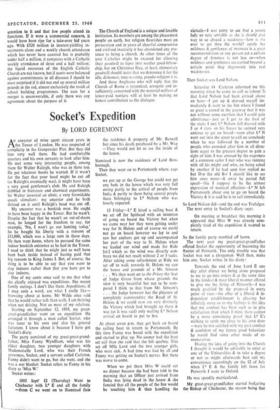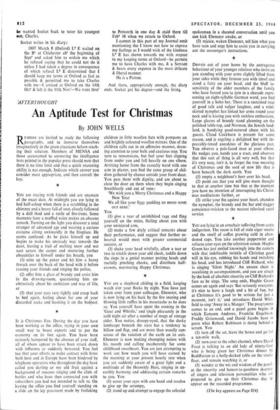Socket's Expedition
By LORD EGREMONT
My ancestor was a bookish man. He ought to have been happy in the Tower. But he wasn't. Despite the fact that he wasn't an out-of-doors man, he longed for the freedom to say, for example, 'No, I won't go out hunting today.' So he bought his liberty with a ransom of £11,000, which was a large sum in those days. He then went home, where he pursued the same indoor bookish existence as he had in the Tower. I used to think that he might just as well have been back inside instead of having paid that big ransom to King James I. But, of course, the thing is to be able to say that you want to stay indoors rather than that you have got to stay indoors.
One of my aunts once said to me that what she chiefly enjoyed was expeditions. She meant family outings. I don't like them. Inpeditions, if I may coin a word, are what I really like— browsing about at home. Mr Wilde once said that he would rather talk than walk. I am thriving when not driving. Not so most of my relatives.
Starting on September 12, 1805, my great- great-grandfather went on an expedition. He arranged it through. a man called Socket, who was tutor to his sons and also his general factotum. I know about it because I have got Socket's diary.
The party consisted of my great-great-grand- father, Miss Fanny Wyndham, who was his eldest daughter, two younger daughters with Mademoiselle Lord, who was their French governess, Socket, and a servant called Carleton. Fanny didn't want to go, but she went, and she was a wet blanket. Socket refers to Fanny in his diary as 'Miss W.'
Socket writes: 1805 Septr 12 (Thursday) Went to Chichester with La E and all the family from C we went on to Stanstead (late the residence & property of Mr. Barwell but since his death purchased by a Mr. Way —They would not let us see the inside of the house.
Stanstead is now the residence of Lord Bess- borough.
Then they went on to Portsmouth where, says Socket, we put up at the George but could not get any beds in the house which was very full owing partly to the arrival of people from India & partly to there being several people there belonging to La Nelson who was hourly expected.
13 Friday—La E hired a sailing boat & we set off for Spithead with an intention of going on board the Victory but when we came near her they were getting under way for St Helens and of course we could not go on board however we lay to and saw her anchors got up and accompanied her part of the way to St. Helens when we hauled our wind and made for Ride [sic] which as the wind was directly con- trary we did not reach without 2 or 3 tacks. After taking some refreshment at Ride we set off to walk towards St. Helens we saw the house and grounds of a Mr. Simeon . . . We then went on to the Priory the Seat of Judge Grose from whose grounds the view is very beautiful but not to be com- pared I think to that from Mr. Simeon's . . . the Judge however has the pleasure of completely commanding the Road of St. Helens & we could now see very distinctly the Victory which had brought up there & was (as it was said) only waiting La Nelson arrival on board to put to Sea.
At about seven p.m. they got back on board the sailing boat to return to Portsmouth. By this time Fanny was bored with the expedition and started to play up. No sooner had the boat set sail than she said that she felt qualmy. This set off Mlle Lord and the two younger girls, who were sick. A bad time was had by all and Fanny was getting on Socket's nerves. But there was worse to come.
When we got there Miss W could eat no dinner because she had been told in the morning that an Officer just arrived from India was lying dead in the house & she fancied that all the people of the Inn would be touching him & then handling the victuals—I was sorry to see that a young lady so very amiable as she is should give way to so absurd a weakness—how is she ever to get thro the world? surely tho mildness & gentleness of manners is a great recommendation to any person yet a certain degree of firmness is not less so—when mildness and gentleness are carried beyond a certain point they degenerate into real weaknesses.
Then Socket sees Lord Nelson.
Saturday 14 Carleton informed me this morning when he came to call us (about 7) that Lord Nelson had been arrived above an hour—I got up & dressed myself im- mediately & went to the Inn where I found so great a crowd in the gateway that it was not without some exertion that I could gain admittance—just as 1 got to the foot of the stairs I met L' Nelson full dressed with 3 or 4 stars on his breast he seemed very anxious to get on board—soon after La N went out into the street to call on somebody when he was followed by a number of people who crowded after him in all direc- tions eager to the greatest degree to gain a sight of him. I was amused by the eagerness of a common sailor I met who was running with all his might and who, on being asked by another if he had seen him replied no but D-n the old B-r I should like to see him once more—& away he posted full speed--this I suppose to be the utmost expression of nautical affection—La N left Portsmouth about one to go on board the Victory & it is said he is to sail immediately.
So Lord Nelson did—and the end was Trafalgar. The next entry in Socket's diary says: On meeting at breakfast this morning it appeared that Miss W was already com- pletely tired of the expedition & wanted to return.
So the family party rumbled off home.
The next year my great-great-grandfather offered Socket the opportunity of becoming the Rector of Petworth. The only trouble was that Socket was not a clergyman. Well then, make him one. Socket writes in his diary: Towards the end of June Lord E one day after dinner we being alone proposed to me to go into orders & at the same time in the kindest & most liberal manner offered, to give me the living of Pctworth—I was much gratified by the proposal in every point of view—the offer of a liberal & in- dependent establishment is pleasing but infinitely more so to my feelings is the idea that my conduct has been such as to give satisfaction than which I think there cannot be a more convincing proof that E's wishing to settle me close to his own door —were he not satisfied with my past conduct & confident of my future good behaviour he would find some other mode of re- muneration.
Having the idea of going into the Church I thought it would be advisable to enter at one of the Universities & to take a degree or not as might afterwards best suit my convenience accordingly on the 12 of July when La E & the family left town for Petworth I went to Oxford.
He was speedily matriculated.
My great-great-grandfather started badgering the Bishop of Chichester, the reason being that
be wanted Socket back to tutor his youngest son, Charles.
Socket writes in his diary:
1807 March 8 (Oxford) 1..." E waited on the BP at Chichester A' the beginning of Sept' and asked him to ordain me which he refused saying that he could not do it unless I had taken a degree in consequence of which refusal LP E determined that I should keep my terms at Oxford as fast as possible & permitted me to take Charles with me—I arrived at Oxford on the 14th Oct' & left it the 11th Nov"—We went thro'
to Petworth in one day & staid there till FebY 16 when we return to Oxford.
I cannot in this part of my Journal omit mentioning tho I know not how to express my feelings as I would wish of the kindness E has shewn towards me with respect to my keeping terms at Oxford--he permits me to have Charles with me, & a Servant & bears every expense in the most delicate & liberal manner.
He is a Patron.
And there, appropriately enough, the diary ends. Socket got his degree—and the living.































 Previous page
Previous page